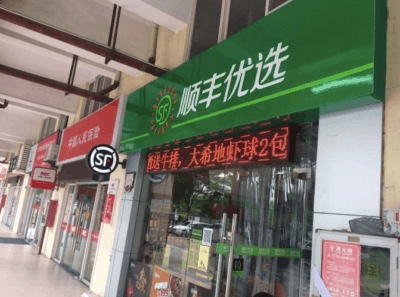
SF Best is said to have closed its Shanghai shops
Chinese logistics company SF Express is said to be closing its offline retail stores in some of China’s largest cities amid an economic slowdown and pressured margins in the logistics sector, according to an account in the local press.
SF Best, the e-commerce and retail arm of the Shenzhen-based delivery service provider, has closed all of its grocery stores in Shanghai, while the shops in the northwestern Chinese city of Xi’an, the Hubei provincial capital of Wuhan and Qingdao in Shandong province are currently holding clearance sales, the report in Chinese tech industry site EqualOcean said.
The apparent setback for the retail venture fostered by the company most often charged with delivering China’s e-commerce miracle, comes after the SF has repeatedly repositioned the business since it initial launch in 2012, and after the parent firm removed the loss-making operation from its listed unit nearly three years ago.
Stores Not Closed, “Just Resting a Bit”
SF Express responded to the media inquiry by saying that the company is carrying out a round of restructuring in certain operational districts in order to concentrate its resources on upgrading its service capacity as well as on improving customer experiences.

SF Express founder Wang Wei
The Shenzhen-listed company said via a spokesperson it will increase its involvement in Beijing and southern China and that the restructuring will allow it to speed up the expansion of SF Best. SF Group said that it will also work to strengthen the online aspect of SF Best to allow it to serve enterprise clients while optimising its use of space and logistics systems.
In the announcement, SF Express did not specify the number of shops that will close. According to listings on lifestyle services platform Dazhong Dianping, SF Best has had 62 stores in Shanghai and more than 120 combined in Xi’an, Wuhan and Qingdao. In 2017, SF Best pledged to open 4,500 offline shops in the following year and set a target of having 10,000 outlets within the next two to three years.
A Fantastic Voyage Seeking Retail Profit
The logistics giant first launched SF Best in 2012 as a platform for selling fresh produce, and as mainland Internet giants latched onto the online-to-offline retail concept in 2014, SF Express hastened to launch its own offline convenience store brand.
In an approach that may have disrupted the company as much as it did the industry, SF chose not to stock merchandise in its stores, which would only function as pick-up locations for customers who had already placed orders online.
In 2015, SF convenience stores were rebranded as Shun Feng Home, leveraging the full name of the company in Chinese, then in 2016, Shun Feng Home was merged into SF Best, offering mostly off-the-shelf imported goods and targeting high end consumers.
Public records show that between 2013 and 2015, Shun Feng’s commercial business, which included the company’s retail endeavor saw a cumulative loss of RMB 1.6 billion, and that in 2016 the business unit was spun off from Shun Feng’s Shenzhen-listed core delivery business.
The retail losses were said mainly to be the result of an aggressive offline expansion in 2014, as well as from management turnover that saw the company churn through seven CEOs. The term of employment for current chief executive, Yan Zhihong, expired at the end of March.
China E-Commerce Giants Rush into Offline Trench Warfare
Shun Feng’s expansion into offline retail came as part of a trend that also won followers at Jack Ma’s Alibaba Group, JD.com and WeChat parent firm Tencent.
China’s second largest e-commerce retailer JD.com said last September that it was planning to open 1,000 app-enabled 7Fresh supermarkets in the next three to five years, stepping up its competition with Alibaba and Tencent to dominate the mainland grocery business.
Then in October, Tencent formed a RMB1.2 billion ($170 million) grocery joint venture with Shanghai-listed supermarket operator Yonghui Superstores and Hong Kong’s ParknShop, while Alibaba’s online to offline grocery chain Hema inked a deal with five of China’s top 10 developers in April last year to expand its Hema supermarket chain.
Leave a Reply